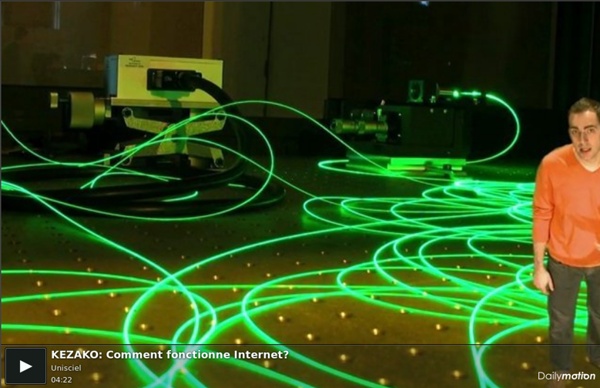



Warriors of the Net Comprendre l'ordinateur - C'est quoi internet ? D'où vient internet ? A l'origine, internet était un réseau militaire américain (appelé ARPANET). Le but était de concevoir un réseau résistant aux attaques: si un point du réseau est anéanti, les informations doivent pouvoir continuer à circuler. Internet a donc été conçu dès l'origine comme une toile d'araignée. Si un point du réseau est anéanti, les autres points du réseau peuvent continuer à communiquer entre eux car les informations empruntent automatiquement un autre chemin. Ce système est encore actif aujourd'hui: Quand vous envoyez ou recevez des informations par internet, vos paquets de données transitent par des dizaines d'ordinateurs différents et peuvent même emprunter des chemins différents. C'est cette «toile d'araignée» qui a donné naissance au mot «web» (qui signifie littéralement «toile d'araignée») et au «World Wide Web» («toile d'araignée mondiale», terme qu'on utilise généralement pour désigner les pages HTML liées entre elles). Pourquoi le mot «internet» ? Liens
Top 10 Portable Tools for Network Administrators by Wesley David - October 27, 2010 Working as a systems administrator oftentimes requires you to interact with many different computers in a single day. One minute you're dealing with cranky users complaining about slow performance on their PCs and the next minute your soothing badly behaving domain controllers. Having to interact with so many different PCs makes it all the more advantageous to keep a core set of tools with you at all times. 1. As of June 2009 there are 66 tools in the suite. As a bonus, each of the Sysinternals tools are available "live" at "live.sysinternals.com\tools" which is essentially just a file share open to the internet. 2. There's a bit of confusion about this topic. Furthering the departure from normalcy, it appears that the term "Support Tools" has been abandoned in favor of the term "Remote Server Administration Tools" (RSAT). 3. Nary does a day go by that your average admin doesn't have to scan a network, IP range or port scan a node. 4. "What about IE!"